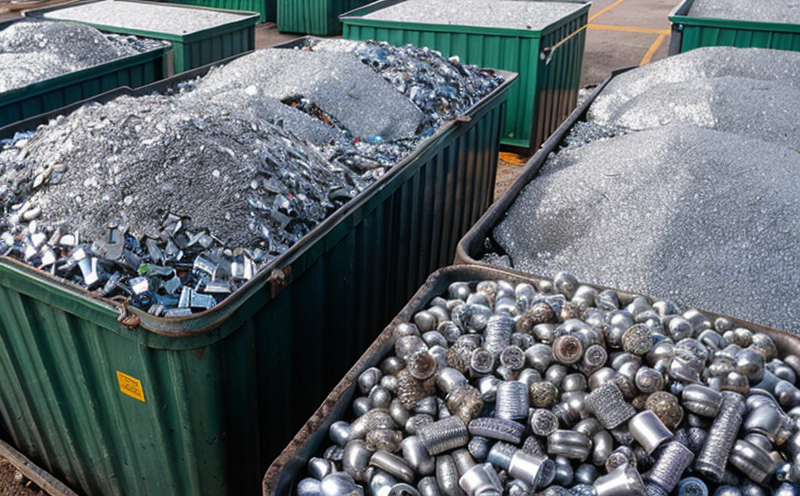EN 17422 Tensile Properties of Recycled Alloys
The European Standard EN 17422 provides a standardized method to determine the tensile properties of recycled alloys, ensuring quality control and compliance in the waste management and recycling sector. This standard is crucial for industries dealing with metal and alloy recycling as it helps assess the mechanical integrity and performance capabilities of recycled materials.
Recycling metals and alloys can significantly reduce environmental impact by conserving natural resources and reducing energy consumption. However, ensuring the quality of these recycled materials is essential to maintain their reliability in various applications. This test method allows for a comprehensive evaluation of tensile properties such as yield strength, ultimate tensile strength, elongation, and reduction of area.
The testing process involves preparing specimens according to EN 17422 specifications. Specimens are typically cut from the recycled material, ensuring they meet the geometric requirements outlined in the standard. The testing machine then applies a controlled load until failure occurs. Careful observation during loading ensures accurate measurement and analysis of each parameter.
The results generated by this test provide valuable insights into how well recycled materials can perform under stress conditions similar to those encountered in real-world applications. Compliance with EN 17422 not only enhances product quality but also supports sustainable practices within the industry, fostering trust among customers who value environmental responsibility.
| Parameter | Description |
|---|---|
| Yield Strength (Rp0.2) | The minimum stress required to cause plastic deformation in a metal. |
| Ultimate Tensile Strength (Rm) | The maximum stress that can be sustained before fracture occurs. |
| Elongation (%A) | The relative increase in length of the specimen after fracture. |
| Reduction of Area (%Z) | The percentage reduction in cross-sectional area at the necking point during tensile testing. |
- Audience: Primarily aimed at quality managers, compliance officers, R&D engineers, and procurement professionals involved in metal and alloy recycling processes.
- Purpose: Ensures the mechanical integrity of recycled alloys used across various industrial applications.
Benefits
Compliance with EN 17422 offers numerous benefits to businesses operating within the waste management and recycling sector. By ensuring that recycled materials meet stringent quality standards, companies can:
- Improve product reliability and customer satisfaction.
- Enhance brand reputation through commitment to environmental sustainability.
- Avoid costly rework or scrap by identifying substandard materials early in the process.
- Gain competitive advantage by offering products that adhere strictly to international standards.
In addition, adherence to this standard fosters collaboration among stakeholders involved in recycling processes, promoting best practices and continuous improvement within the industry. This collaborative approach contributes significantly towards achieving global sustainability goals related to resource conservation and waste reduction.
Industry Applications
The results from EN 17422 testing are widely applicable across several sectors where recycled metals play a critical role. These include:
- Aerospace: Ensuring safety and performance in aircraft components.
- Motorsports: Enhancing vehicle durability without compromising weight.
- Construction: Supporting the development of sustainable infrastructure projects.
- Automotive: Improving fuel efficiency and reducing emissions through lighter vehicles.
| Sector | Description |
|---|---|
| Aerospace | The aerospace industry relies heavily on recycled aluminum alloys due to their lightweight properties, which contribute significantly to fuel efficiency and reduced carbon footprint. |
| Motorsports | Recycled steel is used in motorsports for its strength-to-weight ratio benefits, enhancing the overall performance of racing cars. |
| Construction | In construction projects, using recycled copper and aluminum saves raw materials and reduces landfill waste. |
| Automotive | The automotive sector leverages recycled metals to decrease production costs while maintaining structural integrity and safety standards. |
Why Choose This Test
Selecting the right testing method is crucial when evaluating the tensile properties of recycled alloys. Here are some reasons why EN 17422 should be your preferred choice:
- International Recognition: Accepted globally, this standard ensures uniformity and consistency in test results.
- Accurate Results: Precise measurement techniques ensure reliable data for decision-making purposes.
- Comprehensive Coverage: Covers all essential mechanical properties necessary for comprehensive evaluation of recycled materials.
- Regulatory Compliance: Helps companies stay compliant with relevant regulations and certification requirements.
The accuracy and precision of EN 17422 testing methods make them indispensable tools for maintaining high standards in the recycling industry. They contribute to building confidence among consumers about the quality of recycled products, ultimately driving market acceptance and growth.





